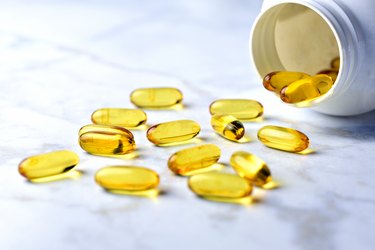
Omega-3 fatty acids are healthy fatty acids found in a variety of foods, though the richest natural sources are in marine animals and plants. Omega-3 supplements have been helpful in the treatment of diseases and can even help prevent cancer. When omega-3 fatty acids are used to treat or prevent such conditions, they are typically clinically recommended at fairly high doses. Dosing ranges between treatments substantially, but high doses are known to cause side effects.
Video of the Day
Video of the Day
Omega-3 Fatty Acids
Omega-3 fatty acids include the fatty acids known as short-chain and long-chain polyunsaturated fatty acids. There are three main long-chain fatty acids, DHA (docosahexaenoic acid), DPA (docosapentaenoic acid) and EPA (eicosapentaenoic acid), with well-known health benefits. When you purchase fish oil or omega-3 supplements, the EPA and DHA content is typically listed.
These fatty acids have been linked to numerous health benefits. Clinically, EPA and DHA have been used to help treat cancer, cardiovascular issues, diabetes, digestive system disorders, eye diseases, neuropsychological issues, respiratory conditions and rheumatological disorders.
Read more: Make Your Heart Happy With Omega-3s
Omega-3 Supplements
Omega-3 pills are typically made from fish oil or algae. They are meant to supplement your own dietary consumption of omega-3 fatty acids, which you can obtain from a number of food products. The Dietary Guidelines for Americans recommend 1.1 to 1.6 grams of omega-3 fatty acids each day. However, this refers to all omega-3s, not just DHA, DPA and EPA.
Most omega-3 pills that you buy online or at health food stores will have about 1,000 mg of fish oil, containing 180 mg EPA and 120 mg DHA. However, you can also purchase extra-strength supplements with as much as 504 mg EPA and 378 mg DHA per 1,400 mg fish oil capsule. As with all supplements, you shouldn't take too much unless your doctor has recommended that you do so.
The FDA recommends no more than 3 grams of combined EPA and DHA per day. However, the European Food Safety Authority recommends doses as high as 5 g per day. Some clinical studies have used even higher doses. Regardless of the total amount, you should only get about 2 g of omega-3 fatty acids from fish oil or supplements.
Read more: The 10 Best Supplements
Omega-3 Supplement Side Effects
Omega-3 supplements, especially at high doses, are often accompanied by side effects. Fortunately, the negative side effects are usually fairly minor. Because omega-3 supplements are made from fish or algae, you may find that your mouth has a lingering fishy taste. In fact, some of the most common side effects of taking omega-3 supplements are fishy breath and indigestion.
Other side effects include diarrhea, heartburn and nausea. Because different manufacturers make omega-3 supplements in different ways, the ingredients in the capsules can affect your symptoms. For instance, gelatin capsules have been associated with upper gastrointestinal tract symptoms, while timed-release capsules have been linked to lower digestive tract symptoms.
As the dosage of omega-3 increases, so do the side effects. In high doses (from 900 mg of EPA and 600 mg of DHA upward), omega-3 can lower the functionality of your immune system. It can also cause increased bleeding by preventing clotting. However, consuming omega-3 fatty acids in higher doses does not seem to cause any negative long-term issues.
Before you start taking omega-3 supplements, ask your doctor how much you should take. This way, you can maximize the benefits while avoiding the side effects. If you do experience side effects, consider taking these pills with food or before bed, when the side effects may be less noticeable.
- “Circulation”; Fish consumption, fish oil, omega-3 fatty acids, and cardiovascular disease; P.M. Kris-Etherton, et al; 2002
- NIH: Omega 3 Fatty Acids
- JAMA Cardiology: Associations of Omega-3 Fatty Acid Supplement Use With Cardiovascular Disease Risks
- Solgar: Triple Strength Omega-3 Softgels
- The British Journal of Psychiatry: Omega-3 fatty acid supplementation in patients with recurrent self-harm - Single-centre double-blind randomised controlled trial
- BMJ Postgraduate Medicine Journal: Omega-3 fatty acids: a comprehensive review of their role in health and disease
- Cochrane Database Systems Review: Omega 3 fatty acids (fish oil) for maintenance of remission in Crohn's disease.
- American Journal of Clinical Nutrition: Omega-3 fatty acids in health and disease and in growth and development
- Lipid Technology: Dietary sources, current intakes, and nutritional role of omega-3 docosapentaenoic acid
- Annals of Clinical Psychiatry: Omega-3 Fatty Acids in Psychiatry: A Review
- International and Community Nutrition Commons: Omega-3 Benefits
- BMJ: Risks and benefits of omega 3 fats for mortality, cardiovascular disease, and cancer: systematic review